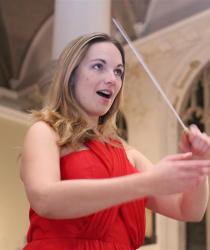
Joanna Tomlinson is not like other people; her day has thirty hours in it, rather than the twenty-four granted to the rest of us. It is the only rational explanation of her ability to maintain a working schedule that would horrify the weaker in spirit. Founder, director and conductor of her own City of London-based choir, Constanza Chorus (http://www.constanzachorus.co.uk); musical director of the University of Reading’s two choirs and the Ince Choir; vocal coach to Farnham Youth Choir and the Polish National Youth Choir; singing teacher at Bedales and Reading University; singer in her own right – all are commitments that must be shoehorned into Joanna’s diary, which is presumably the thickness of War and Peace. “It’s just as well that I’ve always been quite an organised person, even before I was a Bedales pupil,” she acknowledges.
Joanna arrived in Steep as a wide-eyed sixth-former, having spent most of her prior education at an all-girls school in Brighton. “It was as different from Bedales as you could possibly imagine,” she says. “Exceptionally academic, highly traditional but it didn’t offer much in the way of music, which had been my serious interest since I was very young. My aunt was a professional viola player, my cousin a flautist and I became a particularly geeky musician myself. I played the violin and recorder before starting the piano, I sang in the church choir and I even had a bash at composing a string quartet when I was twelve. My piano teacher suggested that Bedales would provide the right environment for me – it looked like good advice. Most of the other mixed schools that we looked at seemed to contain the type of sixth-form boys who called their female contemporaries ‘girly-wirlies’!”
Joanna surveyed the opportunities afforded to her by her new school with an almost dazed sense of awe and immediately plunged into as many as possible. “There was so much to do and I was so busy that I exhausted myself,” she recalls. “It was mainly music and theatre; like a lot of musicians, I successfully avoided anything to do with the great outdoors! I got involved with the theatre stage crew under the guidance of the wonderful Jo Greenwood and in Nick Gleed, I found a musical director who was a kindred spirit and a great influence. Like me, Nick adored Bach and the Twentieth Century composers, preferring to ‘miss out the stuff in the middle’.
Another Bedales mentor soon emerged in the shape of Phillip Guy Bromley, Joanna’s singing teacher. “Phillip was knowledgeable about vocal technique in a way that so few teachers are,” she reflects. “It wasn’t only his technical expertise; he was such an enthusiastic and encouraging man. Nobody had ever told me before that I might be able to become a singer. Because I was doing physics and maths A Levels, I had toyed with the idea of sound engineering as a career. Nick Gleed soon dissuaded me from that and suggested that I would be better suited by a more academic path.”
Before heading to Bristol University, Joanna would spend her gap year teaching at Dunhurst. “It was slightly strange to be back at school in such a different capacity so soon after leaving it,” she remembers. “It was made a lot easier because the Bedalian way is not to talk down to people or treat them as though they are children, whether they are or not. That experience was so valuable when I started to think about teaching music a few years later.”
Up at Bristol, Joanna again threw herself into every conceivable musical activity with characteristic vigour: “I did have to write the occasional essay but for me, uni was mainly about playing music and singing, with the added bonus of being surrounded by a crowd of people who were as into it as I was.” Joanna also conducted the university choir, so reviving an old Bedalian memory. “Alastair Langlands used to take groups of us to his house in Burgundy, where we’d form a small choir,” she says. “I did a little bit of the conducting, which was my first experience of something that I came to love. At Bristol, I felt that I wanted to become a singer but I wish now that I’d understood that it was conducting that was really my forte. It should have been more obvious to me but as a female, conducting wasn’t something that I seriously considered as a career. Opportunities are clearer for aspiring women now, I’m glad to say.”
For two years, Joanna worked in arts administration at the Barbican and for an artistes’ management company before heading to the Royal College of Music to complete a postgraduate diploma in singing. She remains ambivalent about music college: “I don’t know many people who really enjoy their time there,” she suggests. “It’s such an intensely competitive, driven environment. I worked hard and got what I needed from the place but I could have done without the apparent need to oversell its own virtues the whole time.”
The business of earning a living after music college can be a fraught one. “I was lucky,” Joanna says. “I was a decent sight-reader, which was something for which Nick Gleed had been an absolute stickler. That helped get me into the choral scene and all the auditions that go with it. My teaching experience at Dunhurst enabled me to land two days per week of singing teaching at a local school and that was fantastic. To get people passionate about music is so much fun and I do enjoy watching the progress of my students.”
Joanna’s path to a full diary was underway. Her own recent concert engagements have included solos in Mozart’s Mass in C Minor, and Requiem and Haydn’s Creation. She has sung roles for Opera Holland Park and Guildford Opera and her choral work includes the BBC Singers, Gabrieli Consort, Le Concert D’Astrée and Britten Sinfonia Voices.
In the midst of such frenetic activity, Joanna was inspired to establish a new choir of her own. Constanza Chorus was a response to her mother’s dissatisfaction with her own choir and began in 2010 with sixty people attending the first rehearsal in St Mary-at-Hill in the heart of the City of London. “My father works in the City and helped to spread the word about us,” Joanna explains. “Meanwhile, Old Bedalian friends also joined us and in four years, we’ve got the numbers up to 130 and we sang at the Cadogan Hall for the first time earlier this year.” Constanza is a winning combination of family affair and a benign dictatorship. Joanna’s mother handles the administration; her husband, a timpanist, often looks after the instrumental arrangements; her brother handles the choir’s website. “It’s good fun and an extremely sociable group of people but I push them hard,” Joanna admits without a trace of remorse.
Her experience of teaching and of working with enthusiastic amateurs reinforces Joanna’s view that there remains a huge public appetite for the arts in general and music in particular. “It is a worry that the arts seem of so little interest to politicians,” she observes. “If you carry on down that road, of course, we would all ultimately be out of a job. Luckily, I don’t believe that political apathy reflects public demand – look at the Proms, if you doubt it. When music-making is good, it’s the greatest of experiences and sometimes I think that it’s up to us to shout about it and whip up the interest that I know is out there.”
Joanna’s duties as a singing teacher at Bedales have cemented her affection for a place that she still regards as special. “So many of my colleagues used to be my teachers and music department secretary Sheila Rowe is still greeting me like a Mum all these years later,” Joanna says. “I owe Bedales a lot and it’s nice to give something back.”
Joanna Tomlinson was interviewed by James Fairweather in September 2014.
